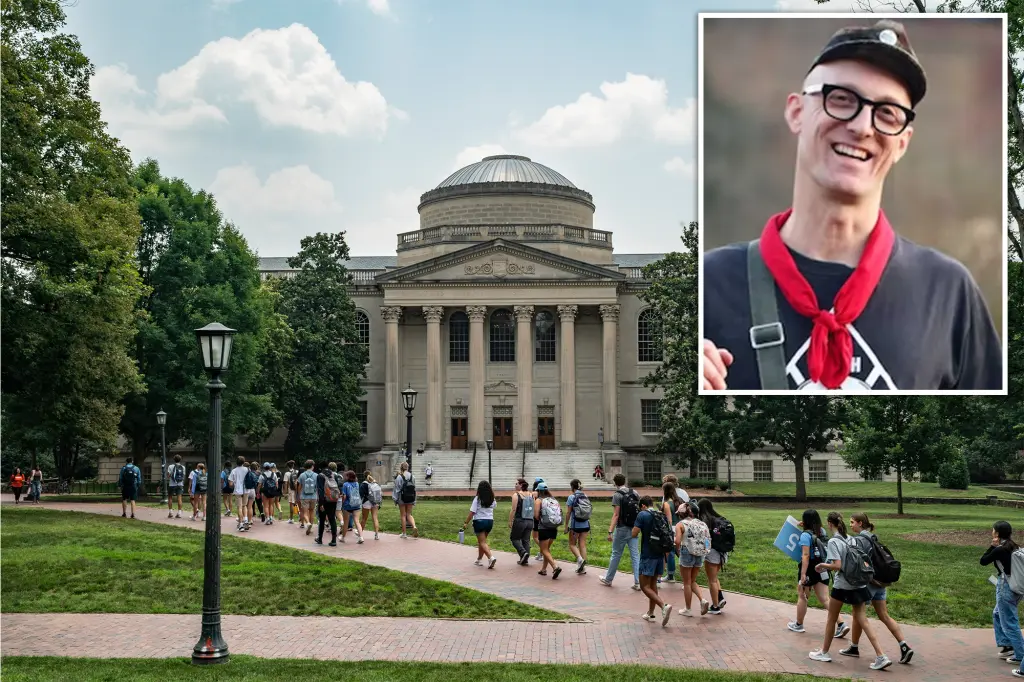UNC Professor Placed on Administrative Leave Over Alleged Political Violence Advocacy
In a significant move that highlights the tensions between academic freedom and concerns over political extremism, the University of North Carolina at Chapel Hill has placed Dr. Dwayne Dixon, a professor in the Asian and Middle Eastern Studies department, on administrative leave. The university’s decision comes amid allegations that Dixon has advocated for politically motivated violence through his association with far-left organizations. This development raises important questions about the boundaries of free speech within academic institutions and the responsibilities of educators to uphold community standards while expressing their political views.
The university’s statement, delivered by Vice Chancellor for Marketing and Communications Dean Stoyer, emphasized that the administrative leave will facilitate a thorough investigation into the allegations against Dixon. The institution made clear that depending on the findings, disciplinary action could range up to potential termination of employment, following established university policies. While reaffirming UNC’s commitment to “rigorous debate, respectful engagement and open dialogue in support of free speech,” the university drew a firm line, stating there is “no place for or tolerance of inciting or extending sympathy toward violence of any kind within the UNC community.” This balanced approach reflects the delicate task universities face in protecting both academic freedom and community safety in an increasingly polarized political landscape.
Dr. Dixon’s controversial profile extends beyond his academic role. He is a self-identified member of Redneck Revolt’s Silver Valley chapter, an organization described by the Counter Extremism Project as a “far-left group” that “stands against capitalism and the concept of the nation-state, including its symbols such as police, prisons, and courts.” His activism has previously drawn public attention and legal scrutiny. In 2017, Dixon participated in an anti-KKK rally in Durham, North Carolina, where he was charged with weapons violations—charges that were eventually dropped. The professor’s public statements about his armed presence at the 2017 Charlottesville rally, where a counter-protester was killed when a neo-Nazi drove into a crowd, have further complicated his standing. During a Harvard University panel, Dixon claimed he had waved off James Fields (the convicted murderer) with his rifle before Fields accelerated and killed Heather Heyer down the block.
The broader context of Dixon’s affiliations raises significant concerns about the intersection of academic freedom and potential extremism. Redneck Revolt, along with several right-wing groups, was sued by the city of Charlottesville and local business owners for allegedly violating anti-paramilitary laws and creating a public nuisance. Rather than go to trial, the organization entered into a consent decree with the city. The group is connected to the John Brown Gun Club, which recently made headlines for posting recruiting flyers at Georgetown University that appeared to celebrate the attempted assassination of conservative commentator Charlie Kirk. These associations place Dixon within a network of organizations that have been linked to confrontational tactics and, in some cases, advocacy for armed resistance against perceived political enemies.
The controversy surrounding Dixon is part of a broader pattern of incidents involving members of groups like the John Brown Gun Club. Earlier this year, Benjamin Song, identified as a member of this organization, was charged with attempted murder of federal agents during an attack on an ICE facility in Texas. In a more extreme case from 2019, Willem van Spronsen, another John Brown Gun Club member, was killed by authorities after attempting to blow up an ICE detention center with improvised explosives. Van Spronsen left behind a manifesto declaring “I am Antifa” and was subsequently praised as a “martyr” by some within left-wing activist circles. These connections raise legitimate questions about whether Dixon’s associations and activities cross the line from protected political speech to advocacy for violence that would fall outside the bounds of academic freedom.
As UNC proceeds with its investigation, this case will likely become a flashpoint in ongoing national debates about the limits of free expression on university campuses, the responsibilities of faculty members, and how institutions should respond to allegations of extremism among their employees. The university must navigate complex terrain: protecting academic freedom and diverse political viewpoints while ensuring that advocacy for violence does not go unchallenged. The outcome will be closely watched by other academic institutions grappling with similar tensions between free speech principles and maintaining safe, respectful campus environments. Whatever the ultimate decision in Dixon’s case, it will almost certainly influence how universities across the country approach these difficult questions in an era of intense political polarization and heightened concerns about extremism across the ideological spectrum.


